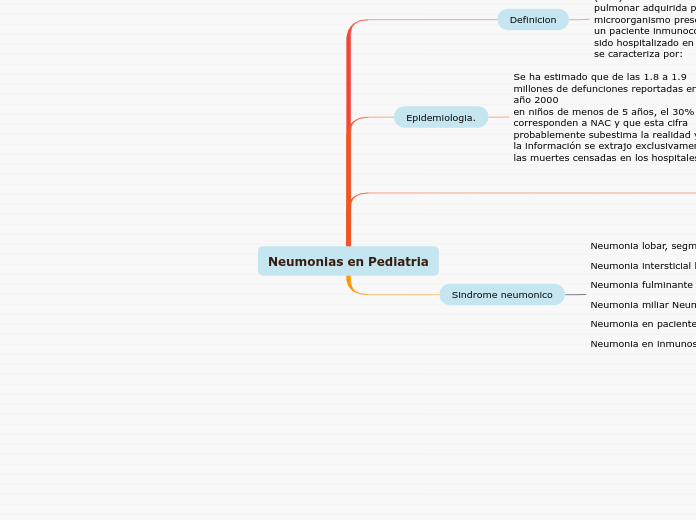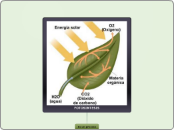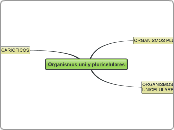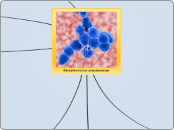Streptococcus pneumoniae, Staphylococcus aureus, Haemophilus influenzae, Streptococcus pyogenes, Mycoplasma pneumoniae, Chlamydophilia pneumoniae (escolares),
adenovirus, virus sincitial respiratorio (VSR) (lactantes),
virus de influenza yTuberculosis
Bacteremia diseminada (S. aureus) y fungemia S. aureus, H. influenzae, P. aeruginosa.
Burkholderia cepacia S. pneumoniae, M. pneumoniae. H. influenzae, S. aureus, P. aeruginosa. P. jiroveci. Aspergillus, M. tuberculosis, otras micobacterias, Citomegalovirus, otros Virus.
Try answering these questions in order for you to come up with a closure:
- Have all problems been solved?
- Is it clear what happens with all your characters in the story?
- Has the challenged transformed your main character?
- How do the characters feel in the end?
Neumonias en Pediatria
To name your story, you have to think about the overall message and what you want your audience to understand from the story. Also, make it relevant and easy to remember.
Sindrome neumonico
Neumonia lobar, segmentaria, esférica o con derrame
Neumonia intersticial bilateral o subaguda con infiltrado minimo
Neumonia fulminante
Neumonia miliar Neumonia nodular
Neumonia en pacientes con fibrosis quistica
Neumonia en inmunosuprimidos
Agentes etiológicos
mas frecuentes
The ending of a story is essential. We all know that if the ending is weak, what happened before loses its importance. So make it unpredictable, but fair. A resolved ending answers all the questions and ties up any loose threads from the plot.
son
This is the closure section of the story.
See examples of possible outcomes below:
- all problems have been solved
- it's clear how each one of your characters ends up
- your main character is transformed by the challenge
Epidemiologia.
The middle of the story is where you add layers of complications that will lead to the end. Reveal more about the character's journey. Did their personality go through changes? How did they overcome the challenges? And as you build up the story’s central conflict, make it more personal to that character. Also, from the middle act, you have to lead into the final act.
Se ha estimado que de las 1.8 a 1.9 millones de defunciones reportadas en el año 2000
en niños de menos de 5 años, el 30% corresponden a NAC y que esta cifra
probablemente subestima la realidad ya que la información se extrajo exclusivamente de
las muertes censadas en los hospitales
Each story has a main character and that character usually needs to solve a problem or challenge. The character's challenge is the one that creates tension throughout the story.
Según la Organización Panamericana de la Salud, en el año de 1999
fallecieron 550 000 niños en Latinoamérica y el Caribe, y de ellos principalmente en
los menores de 5 años de edad.
In most stories, there are 3 challenges. The number 3 is a mystical number symbolizing completeness. Try to come up with interesting challenges with which your character needs to struggle.
See a few examples below:
- turns into a werewolf at night
- is sent back in time
Definicion
In the beginning of the story (or the exposition), you will need to introduce the setting and characters. You might also want to introduce the main conflict. This part of the story is important because it gives the reader necessary background information and maybe even a first insight into a character’s personality.
La Neumonía Adquirida en la Comunidad (NAC) es la infección aguda del parénquima pulmonar adquirida por la exposición a un microorganismo presente en la comunidad, en un paciente inmunocompetente y que no ha sido hospitalizado en los últimos siete días y se caracteriza por:
Characters are essential to a good story. Usually, the protagonist(s) is/are the most affected by the plot. Introduce a character by focusing on their actions, interests, and occupation, as the physical appearance doesn't make a difference in most cases.
caracterizada por
Type in the name of your character.
signos respiratorios (tos, rinorrea, polipnea, dificultad respiratoria) de menos de 15 días de evolución, acompañada de síntomas generales (ataque al estado general, fiebre e hiporexia
Which traits best describe the character's personality? Choose more if necessary:
introvertedloyalkindindependentquick-thinkingadventuresomeidealisticsweet-naturedcalmrisk-takercreativewittystrictfussyweirdclumsyharshaggressivecarelessclingingcowardlycrueldeceitfulimpulsiveOther










